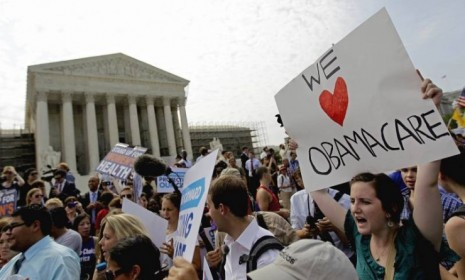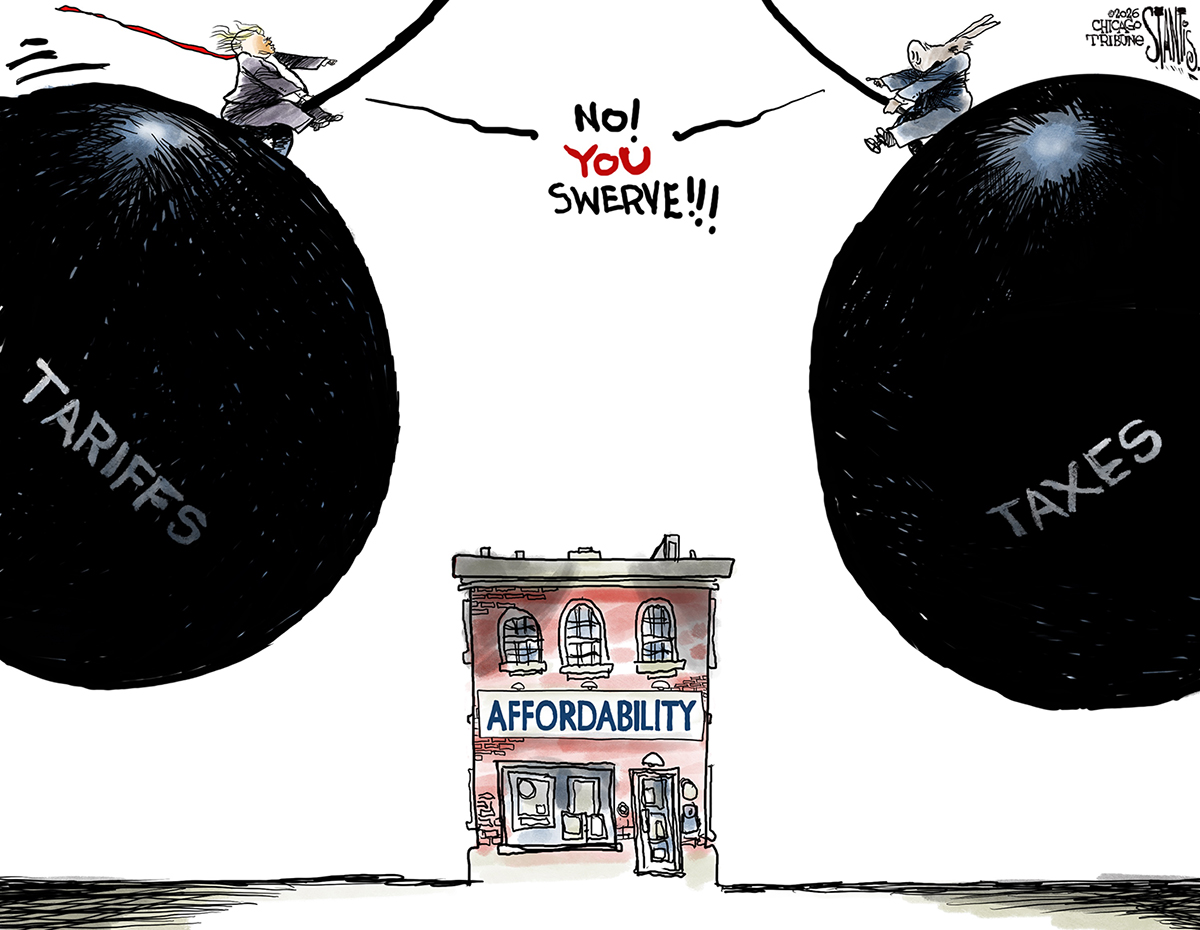ObamaCare's new price tag: A guide
The Congressional Budget Office says the Supreme Court's decision on the Affordable Care Act will lower the cost of the law... but also make it less effective

The Supreme Court's ruling upholding President Obama's health-care overhaul made the law cheaper, the Congressional Budget Office reported Tuesday. The hitch is that the savings — tens of billions of dollars over the next decade — come primarily from the court's decision to allow states to opt out of a costly expansion of Medicaid, which will also reduce the number of uninsured people getting coverage under the law. So is ObamaCare better off, or worse? Here, a brief guide:
How much will the court's ruling save?
It's not clear yet how many states will forgo an expansion of Medicaid, but GOP governors in Florida, Texas, and several other states have already said they won't participate. The non-partisan CBO says its best estimate is that enough states will likely decline the coverage, most of which would be paid for by the federal government, to reduce the net costs by 7 percent — from $1.24 trillion to $1.17 trillion over 11 years — for a total savings of $84 billion.
The Week
Escape your echo chamber. Get the facts behind the news, plus analysis from multiple perspectives.

Sign up for The Week's Free Newsletters
From our morning news briefing to a weekly Good News Newsletter, get the best of The Week delivered directly to your inbox.
From our morning news briefing to a weekly Good News Newsletter, get the best of The Week delivered directly to your inbox.
How many more people will remain uninsured?
Before the ruling, 33 million uninsured people were expected to get coverage under the Affordable Care Act. With some states opting out of the Medicaid expansion, 6 million fewer low-income Americans will get covered under the expansion, the CBO estimates. Half of them, however, should be able to buy their own policies from state-run insurance exchanges, which still leaves 3 million people who would have been covered under Medicaid uninsured.
What if ObamaCare is repealed down the road?
Even with the law in place, 30 million Americans will remain uninsured in 2022, according to the CBO's updated projections. But without the overhaul, an estimated 60 million will be uninsured. Scrapping the law would reduce spending by $890 billion, but it would also reduce revenues by $1 trillion, adding $109 billion to federal deficits over the next decade.
A free daily email with the biggest news stories of the day – and the best features from TheWeek.com
Do these new projections make the law look better, or worse?
The CBO's detailed report is just a "fancy way to say that ObamaCare is going to cost more than they originally thought," says Erika Johnsen at Hot Air. Not only that, but 9 percent of companies say they'll stop offering coverage to their workers once the law takes full effect. This terrible legislation gets "even less attractive" by the day. Actually, "this is yet another reminder that the supposedly deficit-concerned Republican Party still hasn't come to grips with what the Affordable Care Act actually does," says Jonathan Bernstein at The Washington Post: It protects more Americans with health coverage and lowers the deficit — "in part through extra taxes and fees, to be sure, but also to some extent through real cost savings. Either way, just flat-out repeal it, and the deficit goes up."
Sources: Hot Air, New York Times, NPR, Politico, Wash. Post
-
 Political cartoons for January 18
Political cartoons for January 18Cartoons Sunday’s political cartoons include cost of living, endless supply of greed, and more
-
 Exploring ancient forests on three continents
Exploring ancient forests on three continentsThe Week Recommends Reconnecting with historic nature across the world
-
 How oil tankers have been weaponised
How oil tankers have been weaponisedThe Explainer The seizure of a Russian tanker in the Atlantic last week has drawn attention to the country’s clandestine shipping network
-
 The billionaires’ wealth tax: a catastrophe for California?
The billionaires’ wealth tax: a catastrophe for California?Talking Point Peter Thiel and Larry Page preparing to change state residency
-
 Bari Weiss’ ‘60 Minutes’ scandal is about more than one report
Bari Weiss’ ‘60 Minutes’ scandal is about more than one reportIN THE SPOTLIGHT By blocking an approved segment on a controversial prison holding US deportees in El Salvador, the editor-in-chief of CBS News has become the main story
-
 Has Zohran Mamdani shown the Democrats how to win again?
Has Zohran Mamdani shown the Democrats how to win again?Today’s Big Question New York City mayoral election touted as victory for left-wing populists but moderate centrist wins elsewhere present more complex path for Democratic Party
-
 Millions turn out for anti-Trump ‘No Kings’ rallies
Millions turn out for anti-Trump ‘No Kings’ ralliesSpeed Read An estimated 7 million people participated, 2 million more than at the first ‘No Kings’ protest in June
-
 Ghislaine Maxwell: angling for a Trump pardon
Ghislaine Maxwell: angling for a Trump pardonTalking Point Convicted sex trafficker's testimony could shed new light on president's links to Jeffrey Epstein
-
 The last words and final moments of 40 presidents
The last words and final moments of 40 presidentsThe Explainer Some are eloquent quotes worthy of the holders of the highest office in the nation, and others... aren't
-
 The JFK files: the truth at last?
The JFK files: the truth at last?In The Spotlight More than 64,000 previously classified documents relating the 1963 assassination of John F. Kennedy have been released by the Trump administration
-
 'Seriously, not literally': how should the world take Donald Trump?
'Seriously, not literally': how should the world take Donald Trump?Today's big question White House rhetoric and reality look likely to become increasingly blurred